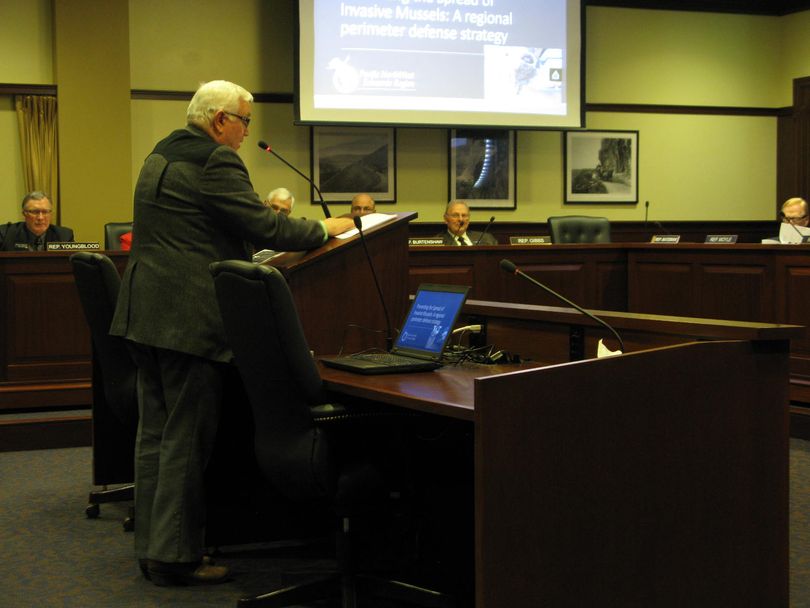Fighting invasive mussels: ‘When you’ve got ‘em, you’ve got ‘em’

Idaho and a few surrounding states are the last places where invasive quagga and zebra mussels haven’t taken hold, Montana Rep. Mike Cuffe, R-Eurka, told the House Resources Committee this afternoon, and a group of Pacific Northwest states and Canadian provinces want to make sure it stays that way, using a "regional perimeter defense strategy." Cuffe, representing the Pacific Northwest Economic Region – a collaborative of five states and five Canadian provinces that currently is chaired by Idaho Sen. Curt McKenzie – said a significant step has been made, as a result of pressure from PNWER and others including Idaho 2nd District Congressman Mike Simpson.
In June of 2014, Congress approved using Water Resources Development Act funds for the problem, including $4 million in one-to-one matching funds to supplement efforts in four states – Idaho, Montana, Washington and Oregon – appropriated for fiscal year 2016 to keep the invasive mussels out. The funding is for watercraft inspection in the Columbia River Basin, administered by the U.S. Army Corps of Engineers. Cuffe said PNWER is advocating for Congress to continue the appropriation in future years.
“We’ve been saying a long time, the feds, this is what U.S. Fish & Wildlife Service should be worried about,” Cuffe told the Idaho lawmakers. “They get to chasing a lot of other things that I think they should stay out of.”
The key now, he said, is for the four states to continue and step up their efforts – not cut back and figure the feds can handle it now. “This is matching money,” he said. “For it to really work for us, you’ve got to at least continue the program you’re doing.” He noted that Idaho spends $1.2 million a year on that effort now, with funding from the Idaho invasive species sticker sales. “Good for you guys for coming up with a way of doing it,” he said. “In Montana, I did it through the general fund for a few different reasons. At any rate, we did a pretty good program also.”
Cuffe paid tribute to former Idaho Rep. Eric Anderson, R-Priest Lake, who led years of efforts to bring attention to the invasive mussel issue; Anderson is now a member of the Idaho Public Utilities Commission. “Eric, he led the way, he forced the way and without him there would not be a lot,” Cuffe said. He warned, "If we get 'em in the region, it's going to cost a half billion dollars a year," and said, "My worry is somebody's going to come along and say, 'Gee, we can cut this program in half. ... That defeats everything that Mike Simpson, Eric Anderson and every one of us have worked for."
“When you get mussels, you’ve got ‘em – it’s a game changer," Cuffe said. "The body of water is never going to be the same again. They filter out the lower life, algae and bugs and little plants … that all your bigger fish and other animals feed from. … They interrupt that food chain, and … there’s no sure-fire way of getting rid of them.”
Cuffe said a perfect example is Lake Winnipeg in Manitoba, which Canadian officials thought couldn’t be invaded because of frigid water temperatures and the lake’s acidity levels. Two years ago, mussels showed up there. Officials heavily treated the lake with potash and thought they’d killed them all, but when they checked again the next spring, the huge lake was still heavily impacted.
House Resources Chairman Dell Raybould, R-Rexburg, told Cuffe Idaho’s been a leader in keeping the mussels out. “We’ve done everything and we’re even considering some other things that may be useful would be huge fines for people who do not get their boats inspected,” Raybould said.
Cuffe responded, “You are right on target – Idaho has been a leader.” He said he hopes that the federal support will double the impact of the four states' efforts – and be even more effective than huge fines.
